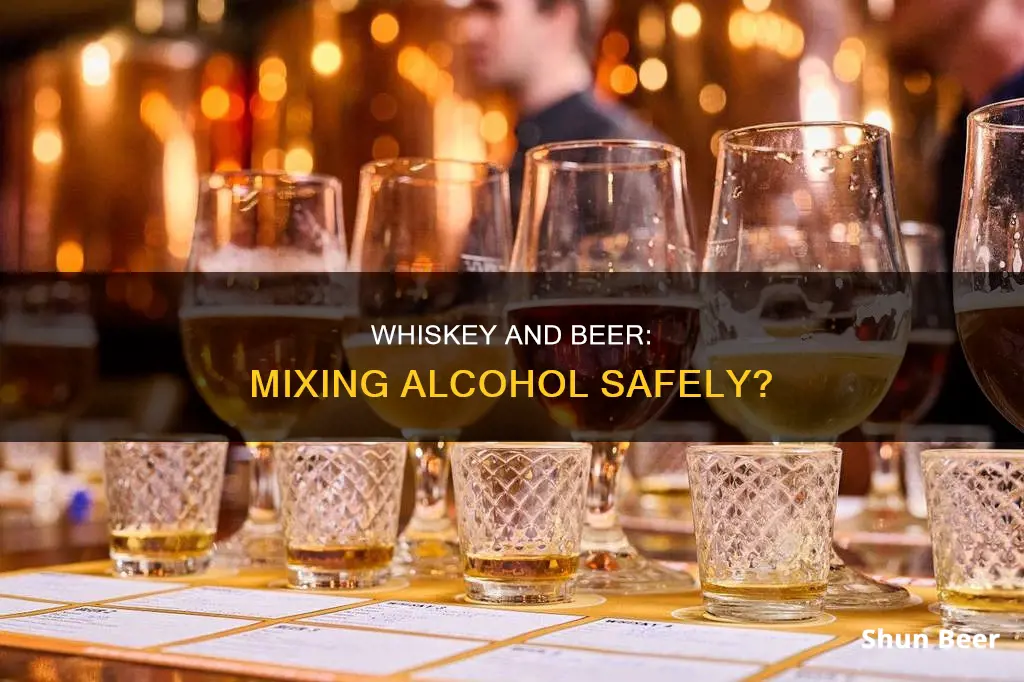
Drinking is a popular pastime for many, but it can also be dangerous if not done responsibly. One of the most well-known drinking adages is beer before liquor, never been sicker; liquor before beer, you're in the clear. This saying is often used to warn drinkers about the potential consequences of mixing different types of alcohol. But is there any truth to it?
The short answer is no. The order in which you consume alcoholic beverages has little impact on whether or not you will experience a hangover. Alcohol is absorbed into the bloodstream as soon as it reaches the stomach, so by the time a hangover sets in, all the alcohol consumed the night before would have already been absorbed. The amount of alcohol consumed is a more significant factor in determining the severity of a hangover than the type of alcohol or the order in which it is consumed.
However, there is some logic behind the saying. Beer is typically consumed at a slower pace than liquor, so starting with liquor may lead to faster drinking and higher alcohol consumption overall. Additionally, carbonated drinks like beer can irritate the stomach lining, increasing alcohol absorption rates.
In conclusion, while the order of consumption may not directly cause a hangover, it can indirectly affect the overall amount of alcohol consumed, which does influence the likelihood and severity of a hangover. As always, it is important to drink responsibly and in moderation.
| Characteristics | Values |
|---|---|
| Drinking beer after whiskey | May not increase the severity of a hangover |
| Drinking order | Unlikely to influence a hangover |
| Hangover severity | Depends on the total amount of alcohol consumed |
What You'll Learn

The saying beer before liquor, never sicker is a myth
The saying "beer before liquor, never sicker" is a myth. The order in which alcoholic drinks are consumed does not influence the severity of a hangover. This has been disproven by a 2019 study, which showed that drinking order and type of alcohol did not affect the severity of a hangover.
The myth likely originated from theories about how the body metabolizes alcohol. Some experts suggest that carbonated drinks like beer can irritate the stomach lining, increasing the rate of alcohol absorption. However, there is little scientific evidence to support this claim.
The amount of alcohol consumed is a more significant factor in determining the severity of a hangover. Drinking too much alcohol, regardless of the type or order, can lead to negative consequences such as sickness and hangovers.
It is worth noting that other factors can also contribute to hangover symptoms, including acetaldehyde, a toxic alcohol byproduct, disrupted sleep patterns, and combining alcohol with other substances. To reduce the risk of a hangover, it is important to drink in moderation, stay hydrated, and get sufficient sleep.
In conclusion, while the saying "beer before liquor, never sicker" has been widely popularized, it lacks scientific evidence. The key to minimizing hangover symptoms is to drink in moderation, regardless of the order or type of alcoholic beverage.
Tums to the Rescue: Beer Sickness Solution?
You may want to see also

The amount of alcohol matters more than the type
The idea that drinking beer after whiskey will make you sick is a myth. The amount of alcohol you consume matters more than the type of alcohol you drink. The International Spirits & Wines Association of India (ISWAI) has emphasised that alcohol is alcohol, irrespective of its form. The alcohol in all drinks is the same, and it has the same effect on the body.
The standard serving of beer, RTDs (Ready-to-Drink), or wine has less alcohol than distilled spirits, but standard serve sizes always contain the same amount of alcohol, which takes into account the ABV (alcohol by volume). Using the 10g definition of a standard serve, a 99ml glass of wine at 13% ABV, a 30ml measure of spirits at 42.8% ABV, or a 257ml glass of beer at 5% ABV all contain the same amount of alcohol.
The liver metabolises alcohol at a constant rate of about one drink per hour. The liver cannot speed up the detoxification process if there is excessive alcohol in the blood. The unmetabolised alcohol continues to circulate in the bloodstream, leading to intoxication. The amount of alcohol in the body is measured as blood alcohol concentration (BAC). A BAC of .08 percent is the equivalent of 1/8 of a drop of alcohol to 1000 drops of blood.
The more alcohol a person consumes, the more it accumulates in the blood, increasing intoxication. The rate of consumption also matters. A person who drinks rapidly becomes intoxicated faster than someone who sips or drinks slowly because they ingest a larger amount of alcohol over the same period.
Carbonated alcoholic drinks increase the rate of alcohol absorption. The pressure inside the stomach and small intestine forces the alcohol to be absorbed more quickly into the bloodstream. Sugars and juices mixed with alcohol also speed up the absorption rate.
However, no level of alcohol consumption is safe for our health. Alcohol is a toxic, psychoactive, and dependence-producing substance. It causes at least seven types of cancer, including bowel cancer and female breast cancer. The risk of developing cancer increases substantially the more alcohol is consumed.
Beer and Gym: Drinking After a Workout, Good or Bad?
You may want to see also

Drinking order may not influence a hangover
The idea that drinking order affects hangovers likely stems from the way we digest alcohol. Carbonated drinks like beer can irritate the stomach lining, increasing alcohol absorption. Additionally, drinking liquor first may lead to drinking less beer later. However, the order of drinks does not affect the amount of alcohol consumed or how it is processed by the body.
The amount of alcohol consumed is the primary factor influencing hangovers. Drinking too much can lead to dehydration, disrupted sleep, gastrointestinal irritation, inflammation, and acetaldehyde exposure, all of which contribute to hangover symptoms.
While drinking beer before liquor may not increase the risk of a hangover, it is important to monitor your alcohol intake and practice responsible drinking to avoid unpleasant after-effects.
Beer Left Out: Is It Still Safe to Drink?
You may want to see also

Congeners in dark spirits may worsen hangovers
The saying goes, "beer before liquor, never been sicker; liquor before beer, you're in the clear." However, the order in which you consume different types of alcohol does not matter. What matters is how much you drink. Drinking too much of any alcohol can make you sick, whether it's wine, beer, or liquor.
That being said, congeners in dark spirits may worsen hangovers. Congeners are compounds produced alongside ethyl alcohol, or ethanol, during the distillation or fermentation process in alcohol manufacturing. They are responsible for giving alcoholic drinks their distinct taste and aroma. Generally, dark alcohol or drinks that are darker in colour have higher congener levels than lighter-coloured drinks.
The amount of congeners in a drink depends on the carbohydrate used, the original sugar, and the yeast strain that ferments the sugar. For instance, tequila, cognac, and whiskey are drinks high in congeners, while clear alcoholic drinks like white wine, light rum, light beer, gin, and sake are low in congeners.
Research suggests that congeners may be responsible for causing or worsening hangovers. For example, methanol, a congener found in dark spirits, breaks down into formic acid and formaldehyde, contributing to a worse hangover. A 2010 study found that participants who consumed bourbon, which has a higher amount of congeners, experienced more severe hangovers compared to those who drank vodka.
To avoid a hangover, it is recommended to limit your consumption of dark alcohol and opt for lighter-coloured drinks with lower congener levels. Additionally, drinking water alongside alcoholic beverages can help prevent dehydration, which can worsen hangover symptoms.
Old Beer: Is It Safe to Drink After a Year?
You may want to see also

Drinking less is the best way to avoid a hangover
The idea that drinking beer after whiskey will make you sick is a myth. The order in which you drink alcoholic beverages does not matter. What matters is how much you drink. Drinking too much alcohol of any kind can make you sick.
However, drinking less is not always easy, especially if you are drinking to get drunk or drinking to cope with difficult emotions. Here are some tips to help you drink less and avoid a hangover:
- Pace yourself: Drinking slowly can help you drink less overall. The average person can process one standard drink per hour.
- Drink water: Alternating alcoholic drinks with water can help you pace yourself and stay hydrated. Alcohol is a diuretic, which means it makes you pee more and can contribute to dehydration. Drinking water can help reduce hangover symptoms such as thirst and headache.
- Eat first: Eating a meal before drinking can slow down the absorption of alcohol into the bloodstream and help keep your blood alcohol concentration lower. Eating fatty foods, high-fiber foods, or foods rich in vitamin C may be especially helpful.
- Choose your drinks wisely: Drinks that are high in congeners—impurities that can contribute to hangover symptoms—include whiskey, cognac, tequila, and bourbon. Clear or light-colored drinks like vodka, gin, and rum have low levels of congeners.
- Avoid carbonation: Carbonated drinks can irritate the lining of the stomach and increase the rate of alcohol absorption.
- Take supplements: Some supplements may help reduce hangover symptoms, although the evidence is not conclusive. B vitamins and zinc may be helpful.
Remember, drinking in moderation or not at all is the best way to avoid a hangover.
Drinking Beer and Driving in Mexico: What's Allowed?
You may want to see also
Frequently asked questions
No, this is a myth. It doesn't matter what order you drink alcohol in, but rather how much you drink.
This saying is based on the idea that you will drink beer faster as you get more drunk, so if you switch to liquor at this point, you will be consuming more alcohol in a shorter amount of time.
No, the order in which you consume alcohol does not affect how drunk you get. It is the total amount of alcohol you consume that matters.
No, the order in which you consume alcohol does not affect your risk of a hangover. It is the total amount of alcohol you consume that matters.
To prevent a hangover, it is important to stay hydrated, drink in moderation, and get plenty of sleep.







